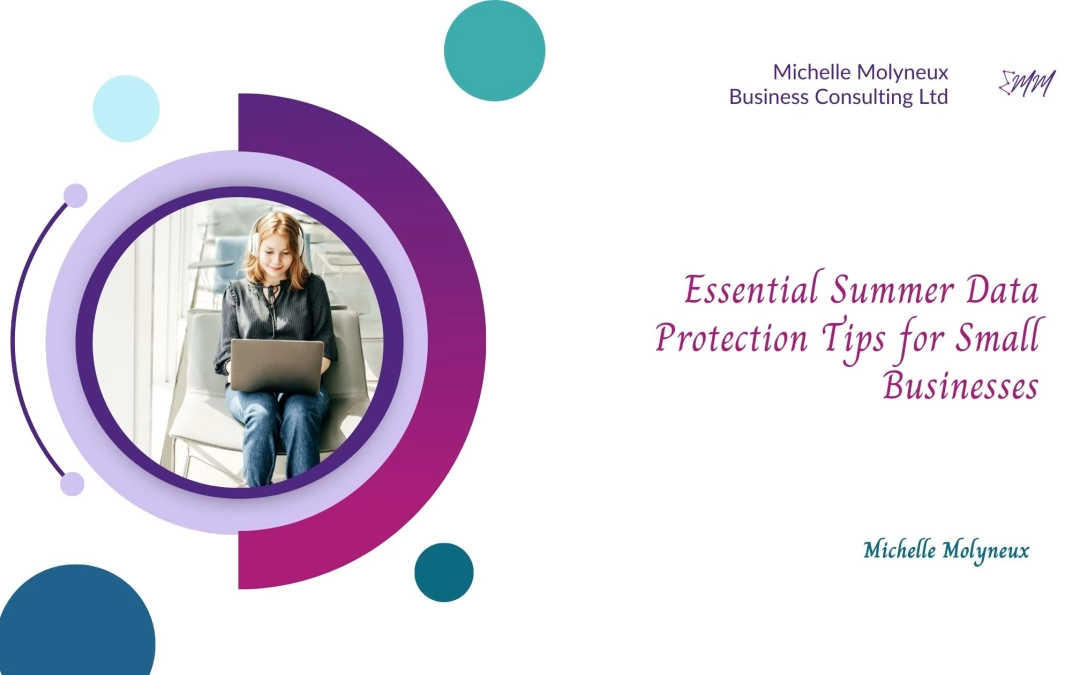Summer is on the horizon, and while it brings opportunities for relaxation and travel, it also introduces unique challenges for maintaining data protection, especially for small businesses. Whether your team is working remotely from a beach or catching up on emails from a café, it’s crucial to keep data security in mind. Here are some essential tips to protect your business data during the summer months.
Secure Remote Working
Increased Travel and Use of Public Wi-Fi With team members often working from various locations, the reliance on public Wi-Fi increases. Public networks are notoriously insecure, making it easier for cybercriminals to intercept data. Here’s how to safeguard your information:
- Use VPNs: A Virtual Private Network (VPN) encrypts your internet connection, ensuring that any data sent or received is secure, even on public Wi-Fi.
- Lock Screens: Encourage employees to lock their screens whenever they’re away from their devices, even if it’s just for a short time. This simple step can prevent unauthorised access.
- Never Leave Equipment Unattended: Laptops, tablets, and smartphones should always be kept in sight or securely stored. Unattended equipment is a prime target for theft.
Compliance with GDPR and Data Protection Regulations
The UK data protection law limits transferring personal data to countries outside the UK and EU. This is unless proper safeguards are in place to protect the data or if the transfer is to a jurisdiction with similar data protection laws. It’s important to note that remote access from a different country is generally considered a data transfer. However, the ICO (the UK’s data regulator) has stated that data transfers to employees in a different country are not restricted. This exception applies to employees, but the ICO views self-employed contractors differently.
UK employers still need to ensure that employees working abroad comply with internal data policies and procedures. This is especially crucial because employers may have less control over their activities in a different country. Furthermore, employers should know local data protection laws to ensure employees processing personal data abroad do not violate local regulations.
The General Data Protection Regulation (GDPR) and other data protection laws don’t take a holiday. Here’s how to stay compliant:
- Risk assessments: Conduct a risk assessment regarding remote working and working abroad,
- Regular Audits: Conduct regular audits of your data protection practices. Ensure that all personal data is stored securely and that you have the necessary consent for any data you hold.
- Update Policies: Review and update your data protection policies regularly to reflect any changes in the law or your business practices. Ensure that employees and team members are aware of and understand these policies.
- Training: Provide ongoing training for employees about data protection best practices and the importance of GDPR compliance. Well-informed employees are your first line of defence against data breaches.
Practical Tips for Data Security
Preventive Measures to Keep Data Safe Implementing a few practical measures can significantly enhance your data security:
- Strong Passwords: Encourage strong and unique passwords for all accounts. Consider using a password manager to help manage and store passwords securely.
- Two-Factor Authentication (2FA): Implement 2FA for an added layer of security. This ensures that even if a password is compromised, unauthorised access is still prevented.
- Regular Backups: Ensure that all important data is backed up regularly. Use encrypted backups to protect against data loss and ensure backups are stored securely.
Mobile Device Management (MDM)
With employees travelling more frequently during the summer, mobile devices are at a higher risk of being lost or stolen. Implementing MDM solutions can help manage and secure these devices:
- Remote Wipe Capabilities: Ensure that devices can be remotely wiped if lost or stolen.
- Device Encryption: Enforce encryption on all mobile devices to protect data.
- App Management: Control which apps can be installed on company devices to prevent malware.
Phishing Awareness
Travelling employees may be more susceptible to phishing attacks. Enhance awareness and provide these tips:
- Verify Emails: Encourage employees to verify the sender’s email address and look out for phishing red flags.
- Avoid Clicking on Links: Advise against clicking links or downloading attachments from unknown sources.
- Report Suspicious Emails: Set up a protocol for reporting and handling suspicious emails.
For further information, why not check out the National Cyber Security Centre on phishing or our article Phishing: What is it and how to identify
Incident Response Plan
Prepare for the unexpected with a robust incident response plan:
- Define Procedures: Clearly outline steps to take during a data breach.
- Regular Drills: Conduct regular drills to ensure employees know how to respond effectively.
- Contact Information: Keep an updated list of contacts for reporting and managing incidents.
Data Minimisation
When travelling, less is more:
- Limit Data: Only take the necessary data and devices for the trip.
- Use Secure Channels: Transmit sensitive information using secure, encrypted channels.
Stay Vigilant and Enjoy the Summer
Data security doesn’t have to be a burden. You can enjoy a secure and worry-free summer by implementing these tips and maintaining a proactive approach. Stay safe, stay secure, and make the most of the sunny season!
For more information or to book a consultation, contact us today!
Other blogs that may be of interest

